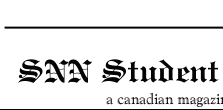 |
 |
|||||
 |
||||||
 |
||||
 |
||||
 |
||||
OPINION
The New Canadian Media: Truth or Spin?
By: Joshua G., Frank Roberts School, Foxtrap, NF
You may have heard of "convergence" - the melding of the various kinds of media in the new Internet-centric world. It means that most of Canada's major media is now held by a handful of companies. And most of these companies are developing closer links to the Canadian political scene by the day. Will this affect me, you might ask? Well, the way things are going, it'll affect you plenty.
Last summer, CanWest Global, owner of Global Television, bought most of the Southam newspaper chain and half of the National Post from Conrad Black's company, Hollinger. Meanwhile, Quebecor, owner of number-two paper chain Sun Media, bought the hugely-popular French-language network TVA. And Bell Canada Enterprises, fresh from its takeover of the CTV network, bought control of the Globe and Mail.
Many people are concerned about these mergers for two reasons. One is diversity. You wouldn't want to read the same story in the local daily newspaper that you saw on the evening news the night before, or look at the opinion in the national paper and see roughly the same thing in the local one. And, for the most part, you don't.
But this may change. Recently, CanWest president Leonard Asper suggested a future where "journalists...wake up, write a story for the web, write a column, take their cameras, cover an event and do a report for TV and file a video clip for the web." Asper has since backtracked on these comments.
In April, pressured by the government and the public, the companies reluctantly agreed to a basic code ensuring some separation between print and broadcast media. The broadcast regulator might, however, force them to use a more stringent separation code, preventing TV and newspapers from sharing any information and preventing reporters from different outlets to talk to each other, which Quebecor has already agreed to follow.
Yet both CanWest and BCE have already orchestrated joint projects between their media outlets. These range from free ads for TV stations in their sister papers, to the cable channel Report on Business Television (with Financial Post TV coming soon).
The other concern is editorial independence - will the owners influence the reporting of the news? Even if management doesn't tell the reporters what they can or cannot say in their articles, surely they must feel pressured to support the owners. Maybe it's just me, but it seems like the Post's TV critic has been supporting Global much more than CTV lately. As they say, don't bite the hand that feeds you.
But then there was the famous "Put Up or Shut Up" editorial. Earlier this year, in the heat of the so-called "Grande-Mère Affair" scandal involving Jean Chrétien, CanWest sent a "must-carry" editorial to all of its newspapers. The editorial, written by Asper's brother, David, alleged that the chain has "had a remarkably unfair 'go' at the prime minister". The comments were mainly directed at the National Post, which was among those forced to publish the article.
Black, who still owns half of the Post and manages the paper, is a far-right conservative and fan of the Canadian Alliance. He has been attacking Chrétien particularly hard since he refused Black's appointment to the British House of Lords. In contrast, his new partner in the Post, CanWest, is owned by Izzy Asper, a former leader of the Manitoba Liberals (and father of Leonard and David). It says it sent the editorial only to ensure balance and fairness in a paper still dominated by extreme conservatives.
And the connection doesn't end with CanWest. BCE is itself a major supporter of the Liberal party. The Toronto Star, controlled by five families that staunchly support the Liberals, has been a leftist paper for nearly all of its existence. The Canadian media has become decidedly left-winged.
We can't be sure that the media will make good on their promises of ensuring diversity in the long term. So all you can do is watch and read the news, then ask yourself: Is the news still reporting the truth? Or just political spin?